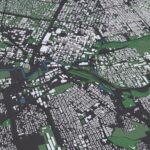Optimizing Urban Traffic Flow: Insights from Recent Studies
Outline
Introduction
Urban traffic flow is a critical aspect of transportation planning, affecting the efficiency, safety, and sustainability of urban areas. With increasing urbanization, optimizing traffic flow has become a priority for cities worldwide. This article explores the latest insights from traffic and transportation studies, focusing on strategies for improving urban traffic flow and the benefits of implementing these solutions.
Overview of Traffic and Transportation Studies
Traffic and transportation studies are essential tools for understanding and managing the movement of people and goods within urban environments. These studies analyze traffic patterns, congestion points, and transportation infrastructure to identify areas for improvement. By leveraging data-driven insights, urban planners can develop strategies that enhance traffic flow, reduce congestion, and improve overall transportation efficiency.
Key Insights on Traffic Flow Optimization
Smart Transportation Systems
Smart transportation systems utilize advanced technologies such as sensors, real-time data analytics, and automated traffic management to optimize traffic flow. These systems can monitor traffic conditions, adjust signal timings, and provide real-time traffic information to drivers. By implementing smart transportation systems, cities can reduce congestion, improve travel times, and enhance the overall efficiency of their transportation networks.
Advanced Traffic Management Strategies
Advanced traffic management strategies involve the use of data-driven approaches to manage traffic flow effectively. This includes techniques such as adaptive traffic signal control, congestion pricing, and dynamic lane management. By analyzing traffic data in real-time, these strategies enable cities to respond quickly to changing traffic conditions, reducing delays and improving the overall efficiency of the transportation network.
Benefits of Traffic Flow Optimization
Optimizing traffic flow offers numerous benefits, including reduced congestion, improved air quality, and enhanced safety for road users. By reducing the time vehicles spend idling in traffic, optimized traffic flow can also lead to significant fuel savings and lower greenhouse gas emissions. Additionally, improved traffic flow can enhance the overall quality of life in urban areas by reducing travel times and increasing accessibility.
Best Practices for Conducting Traffic Studies
Conducting effective traffic studies requires a comprehensive approach that includes data collection, analysis, and stakeholder engagement. Best practices include using advanced data collection methods, such as traffic sensors and GPS data, to obtain accurate traffic information. Additionally, involving stakeholders such as local governments, transportation agencies, and the community in the study process ensures that the findings are relevant and actionable.
Expert Insights
Experts at CCG emphasize the importance of integrating smart transportation systems and advanced traffic management strategies to optimize urban traffic flow. By leveraging cutting-edge technologies and data-driven insights, CCG professionals help cities develop effective traffic management plans that improve transportation efficiency and reduce congestion.
Conclusion
Optimizing urban traffic flow is essential for creating efficient, sustainable, and livable cities. By implementing smart transportation systems and advanced traffic management strategies, cities can reduce congestion, improve air quality, and enhance the overall quality of life for residents. Contact our team at CCG to learn more about how we can assist with your traffic and transportation studies, helping you achieve optimized traffic flow in your urban area.
Frequently Asked Questions
Smart transportation systems use advanced technologies such as sensors, real-time data analytics, and automated traffic management to optimize traffic flow. These systems help reduce congestion and improve travel times in urban areas.
Traffic management strategies, such as adaptive traffic signal control and congestion pricing, use real-time data to manage traffic flow effectively. These strategies help reduce delays and improve the efficiency of transportation networks.
Optimizing traffic flow offers benefits such as reduced congestion, improved air quality, fuel savings, and enhanced safety for road users. It also improves travel times and accessibility in urban areas.
Get in Touch
If you're looking to optimize traffic flow in your city, get in touch with us today. Our team at CCG is ready to assist with your traffic and transportation studies, helping you achieve efficient and sustainable urban mobility.













